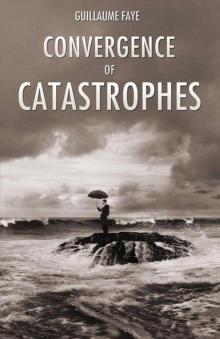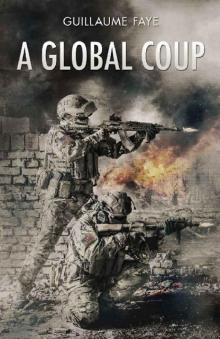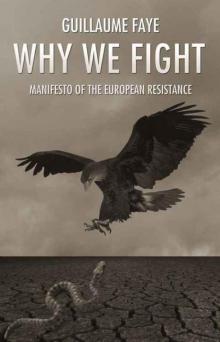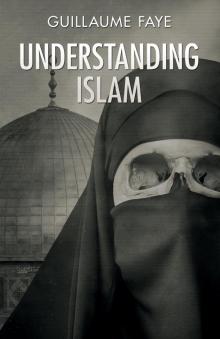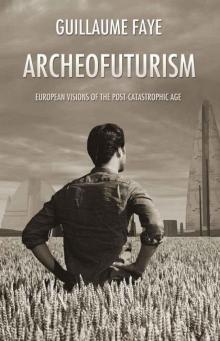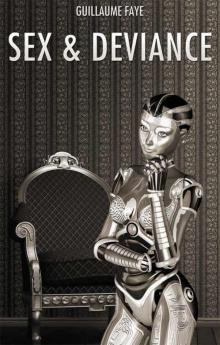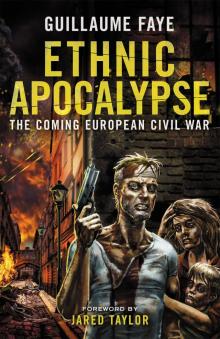Convergence of Catastrophes, page 25




[6] Paul D. MacLean (1913-2007) was an American neuroscientist who developed the triune theory of the human brain, postulating that, over the course of its evolution, the brain was actually made up of three distinct elements: the reptilian complex, the limbic system, and the neocortex. As a result, human behavior is the product of all three tendencies.
[7] Konrad Lorenz (1903-1989) was an Austrian ethologist who won the Nobel Prize in 1973. He was a member of the National Socialist Party during the Third Reich. He speculated that the supposed advances of modern life were actually harmful to humanity, since they had removed humans from the biological effects of natural competition and replaced it with the far more brutal competition inherent in relations between individuals in modern societies. After the war, his books on popular scientific and philosophical topics earned him international fame.
[8] Arthur Koestler (1905-1983) was a Hungarian writer who, in his 1967 book The Ghost in the Machine, speculated that the triune model of the brain as described by Paul MacLean was responsible for a failure of the various parts to fully interconnect with each other, resulting in a conflict of desires within each individual leading to self-destructive tendencies.
[9] Jean Rostand (1894-1977) was a French biologist who was a proponent of eugenics as a means for humanity to take responsibility for its own destiny. He was also a pioneer in the field of cryogenics.
[10] Gaïa is the Ancient Greek name for the goddess of the Earth. In recent decades, the name has been adopted by ecologists, who use it to depict the combined components of the Earth as a living organism with its different parts acting in symbiosis with one another, rather than as a resource merely intended to be exploited by humans.
[11] Latin: ‘pride’.
[12] Jules Verne (1828-1905) was a French novelist who is regarded as the inventor of the science fiction genre. Several of his books are notable for their predictions of future technological developments.
[13] Positivism holds that the only knowledge which can be considered reliable is that which is obtained directly through the senses and via the (supposedly) objective techniques of the scientific method.
[14] Émile Coué (1857-1926) was a French psychologist whose method involved repeating ‘Every day, in every way, I am getting better and better’ at the beginning and end of each day in a ritualised fashion, believing that this would influence the unconscious mind in a manner that would allow the practitioner to be more inclined toward success.
[15] The Institut français d’opinion publique, or French Institute of Public Opinion, is an international marketing firm.
[16] René Thom (1923-2002) was a French mathematician who made many achievements during his career, but is best remembered for his development of catastrophe theory. The theory is complex, but in essence it states that small alterations in the parameters of any system can cause large-scale and sudden changes to the system as a whole.
[17] The Fifth Republic began after the collapse of the Fourth Republic in 1958 as a result of the crisis in Algeria, bringing Charles de Gaulle to power and resulting in the drafting of a new constitution. It has remained in effect up to the present day.
[18] Latin: ‘an argument with a stronger foundation’.
[19] King Arthur’s Camelot was frequently left unguarded while his knights were engaged in lengthy quests.
[20] The Kyoto Protocol is an effort by the United Nations to reduce greenhouse gas emissions worldwide, its first phase being the period between 2008 and 2012. It was signed on 11 December 1997 and went into effect in February 2005. Non-developed nations were not required to reduce their emissions, however, and this includes India and China, the world’s two largest population centres and both are among the largest emitters. Other Asian countries, including Indonesia and Thailand, are also among the top emitters, yet are not bound by the treaty. The United States signed, but refused to ratify the treaty on these grounds, and Canada withdrew in 2011.
[21] Hervé Le Treut and Jean-Marc Jancovici, L’effet de serre: allons-nous changer le climat? (The Greenhouse Effect: Will We Change the Climate?) (Paris: Flammarion, 2004).
[22] L’avenir climatique: quel temps ferons-nous? (The Climate of the Future: How Much Time Do We Have?) (Paris: Éditions du Seuil, 2002).
[23] Alexis De Tocqueville (1805-1859) was a French political thinker best known for his work, Democracy in America, which was based on his experiences while travelling in the United States. Although Tocqueville was a democrat who opposed the monarchy of his day, he also opposed the socialist radicals. In his study of the U.S., he praised America’s democratic system, but disliked Americans’ obsession with money and their contempt for elites, since even though the latter is what enabled them to do away with the old colonial aristocracy, it also caused them to disregard the most intelligent members of their society, coining the term ‘tyranny of the majority’ to describe it.
[24] The summer of 2003 was the hottest summer on record in the history of Europe. Nearly 15,000 people died in France alone from the heat. Many critics blamed the government for weaknesses in the national health care system that made it more difficult to deal with the crisis.
[25] Serge Latouche, Justice sans limites: Le défi de l’éthique dans un économie mondialisée (Justice without Limits: The Challenge of Ethics in a Globalised Economy) (Paris: Fayard, 2003).
[26] The Club of Rome is a global think tank which was founded in 1968 to address the problems faced by humanity. In 1972 its members published a controversial book, The Limits to Growth, which held that the rapid increase in the global population combined with dwindling resources would lead to disaster if changes were not implemented.
[27] David Stipp, ‘Climate Collapse: The Pentagon’s Weather Nightmare’ in Fortune (26 January 2004). Online version: ‘The Pentagon’s Weather Nightmare’, available at money.cnn.com/magazines/fortune/fortune_archive/2004/02/09/360120/index.htm.
[28] David Stipp, ‘Climate Collapse: The Pentagon’s Weather Nightmare’.
[29] Peter Schwartz and Doug Randall, ‘An Abrupt Climate Change Scenario and Its Implications for United States National Security’ (October 2003), available at www.climate.org/PDF/clim_change_scenario.pdf.
[30] Peter Schwartz and Doug Randall, ‘An Abrupt Climate Change Scenario and Its Implications for United States National Security’, p. 19.
[31] Peter Schwartz and Doug Randall, ‘An Abrupt Climate Change Scenario and Its Implications for United States National Security’, p. 15.
[32] David Fleming, ‘The Wages of Denial’, in Ecologist (1 April 2003), available at ecologist.testing.net-genie.co.uk/investigations/energy/82839/oil_security.html.
[33] The largest administrative region in France, containing Paris.
[34] Ethnomasochism, according to Faye in his book Why We Fight: Manifesto for the European Resistance (London: Arktos, 2011), is ‘[t]he masochistic tendency to blame and devalue one’s ethnicity, one’s own people’.
[35] Tenue de protection à usage unique, or disposable biohazard suit.
[36] Samuel Huntington (1927-2008) was an American political scientist who became infamous for serving as an advisor to authoritarian regimes, such as South Africa in the 1980s. He famously postulated that nations in the process of transitioning into modernity must be cautious about not introducing democracy too quickly into their societies, and that repressive measures can actually be necessary and beneficial in the short term. More recently, he became well-known for his 1993 essay ‘The Clash of Civilizations’ published in Foreign Affairs, which was later expanded into a book of the same name, in which he theorised that the changing world order following the collapse of Communism would be defined by conflicts between cultural blocs, such as the West and the Islamic world.
[37] Carl Schmitt (1888-1985) was an important German jurist who wrote about political science, geopolitics and constitutional law. He was part of the Conservative Revolutionary movement of the Weimar era. He also briefly supported the National Socialists at the beginning of their regime, although they later turned against him. He remains highly influential in the fields of law and philosophy. He describes his ideas about the partisan in Theory of the Partisan (New York: Telos Press, 2007).
[38] Aum Shinrikyo is a New Age cult based in Japan, the beliefs of which are derived from a variety of sources, including Buddhism. On 20 March 1995, some of its members released sarin gas into the Tokyo subway system, killing 30 people and injuring hundreds more. During the subsequent trial, the prosecution later claimed that the goal of the attack had been to bring about the downfall of the Japanese government. The group continues to exist under the name Aleph.
[39] On 23 October 1983, two simultaneous suicide truck bombings hit the barracks of the United States Marines and of the French paratroopers in Beirut, who were part of the Multinational Force which was there to oversee the conflict between Israel and the Palestinians. Over 300 people, mostly American and French servicemen, were killed, and led to the withdrawal of the Multinational Force from Lebanon. The responsibility for the bombings has never been firmly established, although it is widely believed that the Lebanese Islamist group Hezbollah, acting on instructions from the Iranian government, carried out the attacks.
[40] Julien Freund (1921-1993) was a student of Raymond Aron and Carl Schmitt. During the Second World War, he was a member of the French Resistance movement. After the war he became a professor of sociology at the University of Strasbourg. In 1980, in protest against the French educational system and its methods of teaching political science, he decided to retire. He was also a contributor to New Right publications in both Germany and France.
[41] According to records released by the US government of the interrogation of the captured mastermind of the September 11 attacks, Khalid Shaikh Muhammad, targeting nuclear plants was considered as Al Qaeda, but this was eventually ruled out due to fears of the American reaction to such an attack.
[42] Jean de La Fontaine (1621-1695) was a Seventeenth-century French poet.
[43] In this fable, a gnat challenges a lion to a fight. The lion, enraged that he is being attacked by such a tiny creature, tries to kill the gnat as it attaches itself to various parts of his body, but the gnat is so small as to be able to evade the lion’s strikes, and continues to annoy him. Exhausted, the lion finally gives up the fight.
[44] Paul Virilio (b. 1932) is a French philosopher who writes primarily about technology, as well as what the use of physical space tells us about the institutions that utilise it.
[45] Carl von Clausewitz (1780-1831) was a Prussian officer and military strategist whose principal work, On War, continues to be regarded as one of the most important formulations of strategic theory.
[46] The term ‘strategy of tension’ was coined by Leftist groups in Italy in the 1970s, who claimed that the United States and domestic Right-wing elements were responsible for terrorist attacks that were in turn blamed on Left-wing groups, causing them to be discredited and for the population to call for stronger government powers to combat them.
[47] Robert S. McNamara (1916-2009) was the United States Secretary of Defense from 1961 until 1968, including during the outbreak of the Vietnam War. While he did pursue the strategy of containment, the strategy itself was first developed by George F. Kennan (1904-2005) as an advisor to President Truman during the late 1940s, setting the tone for America’s approach to the Soviet Union throughout the Cold War.
[48] The Canal Hotel, which was being used by the United Nations for its headquarters in Iraq at the time, was bombed on 19 August 2003, killing 22 people, including the UN’s Special Representative, Sérgio Vieira de Mello. At first, the group Ansar al-Islam was thought to be responsible, but subsequent investigation determined that Abu Musab al-Zarqawi’s al-Tawhid wal-Jihad, later renamed Al Qaeda in Iraq, was the most likely culprit.
[49] Arabic: ‘holy warriors’.
[50] Jeffrey Fleishman, ‘Some Plotters May Have Gone West’ in the Los Angeles Times (20 May 2003), available at articles.latimes.com/2003/may/20/world/fg-terror20.
[51] On 12 May 2003, attacks were carried out on a compound in Riyadh which housed many foreigners, killing 35 and injuring more than 160, including many from the United States and Europe.
[52] Richard Norton-Taylor, ‘Al-Qaida is Back and Stronger Than Ever’ in The Guardian (19 May 2003), available at www.guardian.co.uk/world/2003/may/19/alqaida.terrorism2.
[53] Vigipirate is France’s national security alert system, created in 1978. Similar to the now-defunct Homeland Security Advisory System in the United States, it uses five colors (white, yellow, orange, red and scarlet) to represent varying levels of readiness in response to intelligence about terrorist threats.
[54] TGV is France’s national high-speed railway network.
[55] Sheikh Yusuf al-Qaradhawi (b. 1926) is an Egyptian theologian who has a regular programme on Al Jazeera, and is regarded as a Muslim public intellectual of global importance. He has worked with Egypt’s Muslim Brotherhood, although has never held any official status. He opposed the September 11 attacks and supported the Arab Spring uprising in Egypt, and also issued a fatwa against Libya’s Gaddafi in 2011. He has held a number of academic positions, including acting as a trustee for the Oxford Centre for Islamic Studies. Nevertheless, in response to some of his proclamations, including his support for attacks against Israel, he has been restricted from entering the United States since 1999, the United Kingdom since 2008, and France in 2012.
[56] This fatwa was originally posted at Islam Online on 2 December 2002.
[57] Reported by the Israel-based Middle East Media Research Institute (MEMRI) in ‘Leading Sunni Sheikh Yousef Al-Qaradhawi and Other Sheikhs Herald the Coming Conquest of Rome’ (6 December 2002), available at www.memri.org/report/en/0/0/0/0/0/0/774.htm#_edn7.
[58] MEMRI, ‘Leading Sunni Sheikh Yousef Al-Qaradhawi and Other Sheikhs Herald the Coming Conquest of Rome’.
[59] MEMRI, ‘Leading Sunni Sheikh Yousef Al-Qaradhawi and Other Sheikhs Herald the Coming Conquest of Rome’.
[60] Oriana Fallaci, The Rage and the Pride (New York: Rizzoli, 2002).
[61] Oriana Fallaci (1929-2006) was an Italian journalist who had fought as an anti-Fascist partisan in her youth. During her career, she was known for her coverage of wars and her often contentious interviews with world leaders, including Ayatollah Khomeini. After the September 11 attacks, she wrote three books that were extremely hostile to Muslims and Islam as a religion, sparking a great deal of international controversy.
[62] Ressentiment, literally ‘resentment’, has a much stronger meaning in French. It suggests the endless repetition of the disgust that one feels towards a person or thing, resulting in a deep-seated aversion that becomes part of a person’s essential nature.
[63] Enrique Montánchez and Pedro Canales, En el nombre de Alá: la red secreta del terrorismo islámico en España (Barcelona: Editorial Planeta, 2002).
[64] Isabela I of Castile (1451-1504), known as ‘the Catholic’, was Queen of Spain in 1492, when the 800-year Reconquista, which saw the expulsion or conversion to Catholicism of all Muslims and Jews in Spain, was successfully concluded.
[65] Wayne Miller, ‘Secret Guide Details JI Plan for Conquest’, in Sydney Morning Herald (1 September 2003).
[66] On 12 October 2002, a popular nightclub on the Indonesian island of Bali was bombed, killing 202 people, including 88 Australians and other foreigners, and injuring hundreds more. Several members of Jemaah Islamiyah were said to be the perpetrators. A week later, Osama bin Laden released a statement claiming that the attack was in retaliation for Australia’s support for the ‘war on terror’ and other crimes against Muslims. One of the terrorists, Ali Ghufron, was said to be the author of the General Guide to the Struggle.
[67] Central Directorate of General Intelligence was the intelligence arm of the French police. In 2008 it was merged into a new department.
[68] In France, the various provinces are referred to as departments.
[69] In French, porteurs de valise, which was a term used to describe Frenchmen, usually Communists, who assisted the Algerian guerrillas in the 1954-62 Algerian War.
[70] In July 2001, a French Algerian named Djamel Beghal was arrested at the airport in Dubai for falsifying his passport. It soon became apparent that he had been attempting to return to Europe after receiving training from Al Qaeda in Afghanistan. Under interrogation, Beghal confessed to attempting to relay instructions from Osama bin Laden to cell members in France, the Netherlands and Belgium to carry out simultaneous attacks on the U.S. embassy and the American cultural centre in Paris. The French authorities began their arm of the investigation on 10 September 2001. Many suspected terrorists were arrested in seven European countries and the United Arab Emirates as a result, many of whom were found to be in possession of large quantities of explosives and other tools related to the attack.

